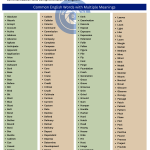Difference Between Noun and Pronoun
In the English language, nouns and pronouns play a crucial role in sentence structure and meaning. While both serve to identify people, places, things, or ideas, they function differently and have distinct purposes.
What is a Noun?
A noun is a word that names a person, place, thing, or idea. Nouns serve as the main building blocks of sentences, acting as subjects, objects, and complements.
Examples:
- Person: John, teacher, doctor
- Place: New York, school, park
- Thing: book, car, computer
- Idea: freedom, love, intelligence
Types of Nouns:
- Common Nouns: General names for a person, place, or thing (e.g., city, dog, car).
- Proper Nouns: Specific names for a person, place, or thing, always capitalized (e.g., London, Einstein, Coca-Cola).
- Concrete Nouns: Things that can be perceived by the senses (e.g., apple, music, water).
- Abstract Nouns: Ideas or concepts that cannot be physically touched (e.g., happiness, time, justice).
- Collective Nouns: Names for a group of people or things (e.g., team, family, flock).
- Countable Nouns: Things that can be counted (e.g., books, apples, cars).
- Uncountable Nouns: Things that cannot be counted (e.g., sugar, water, information).
What is a Pronoun?
A pronoun is a word that substitutes for a noun or a noun phrase in a sentence. Pronouns are used to avoid repetition, make sentences less cumbersome, and streamline communication. They help in making the text more coherent and less repetitive.
Examples:
- Personal Pronouns: I, you, he, she, it, we, they
- Possessive Pronouns: mine, yours, his, hers, its, ours, theirs
- Reflexive Pronouns: myself, yourself, himself, herself, itself, ourselves, yourselves, themselves
- Demonstrative Pronouns: this, that, these, those
- Interrogative Pronouns: who, whom, whose, which, what
- Relative Pronouns: who, whom, whose, which, that
- Indefinite Pronouns: anyone, everybody, someone, none
Types of Pronouns:
- Personal Pronouns: Refer to a specific person or thing and change form to indicate singular or plural and subject or object (e.g., I, you, he, she, it, we, they).
- Possessive Pronouns: Indicate ownership (e.g., mine, yours, his, hers, ours, theirs).
- Reflexive Pronouns: Refer back to the subject of the sentence (e.g., myself, yourself, himself, herself, itself, ourselves, yourselves, themselves).
- Demonstrative Pronouns: Point to specific things (e.g., this, that, these, those).
- Interrogative Pronouns: Used to ask questions (e.g., who, whom, whose, which, what).
- Relative Pronouns: Introduce relative clauses and relate to the noun previously mentioned (e.g., who, whom, whose, which, that).
- Indefinite Pronouns: Refer to non-specific people or things (e.g., anyone, everyone, someone, nothing, nobody).
Difference Between Noun and Pronoun
| Feature | Noun | Pronoun |
| Definition | Names a person, place, thing, or idea. | Substitutes for a noun or noun phrase. |
| Examples | John, city, apple, freedom | he, she, it, they, this, that, who, which |
| Function | Acts as the subject, object, or complement in a sentence. | Replaces a noun to avoid repetition and simplify sentences. |
| Types | Common, Proper, Concrete, Abstract, Collective, Countable, Uncountable | Personal, Possessive, Reflexive, Demonstrative, Interrogative, Relative, Indefinite |
| Specificity | Provides specific names and detailed information. | Provides less specific references, relies on context. |
| Usage Example | The dog barked loudly. | It barked loudly. (replacing “the dog”) |
| Capitalization | Proper nouns are capitalized (e.g., London). | Pronouns are generally not capitalized unless starting a sentence. |
| Role in Clarity | Provides clear, specific details. | Helps in making text concise and avoids redundancy. |
| Variation | Numerous types based on specificity and tangibility. | Various types to address different grammatical needs. |
| Grammatical Agreement | Nouns typically determine the agreement of other words in the sentence (e.g., verbs, adjectives). | Pronouns must agree in gender, number, and case with the nouns they replace. |
Understanding the difference between nouns and pronouns is fundamental in mastering English grammar. Nouns provide the specific names of people, places, things, or ideas, while pronouns take the place of nouns to avoid redundancy and streamline sentences. Both are essential components of language that work together to create clear and concise communication.
Download Words Coach Application





